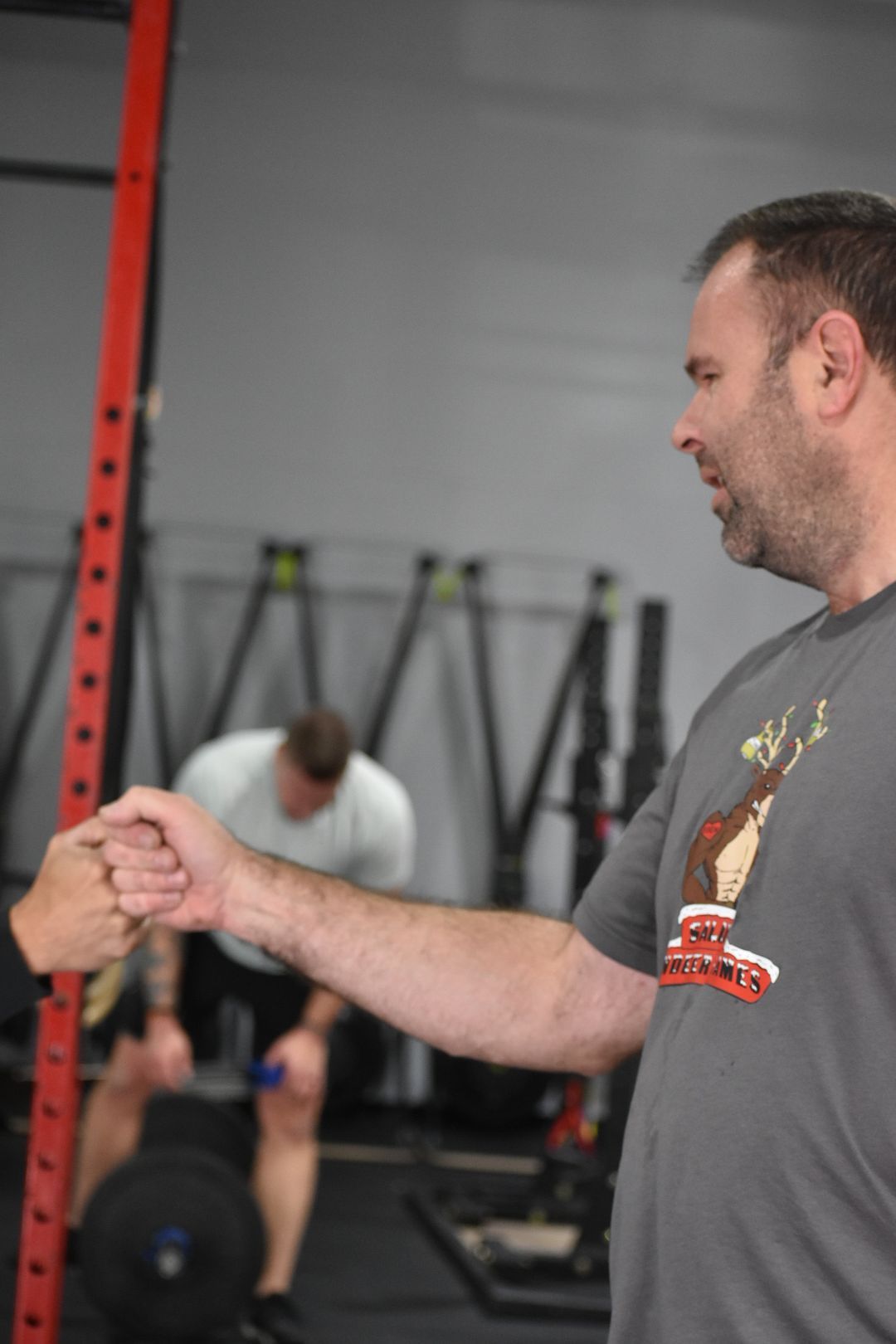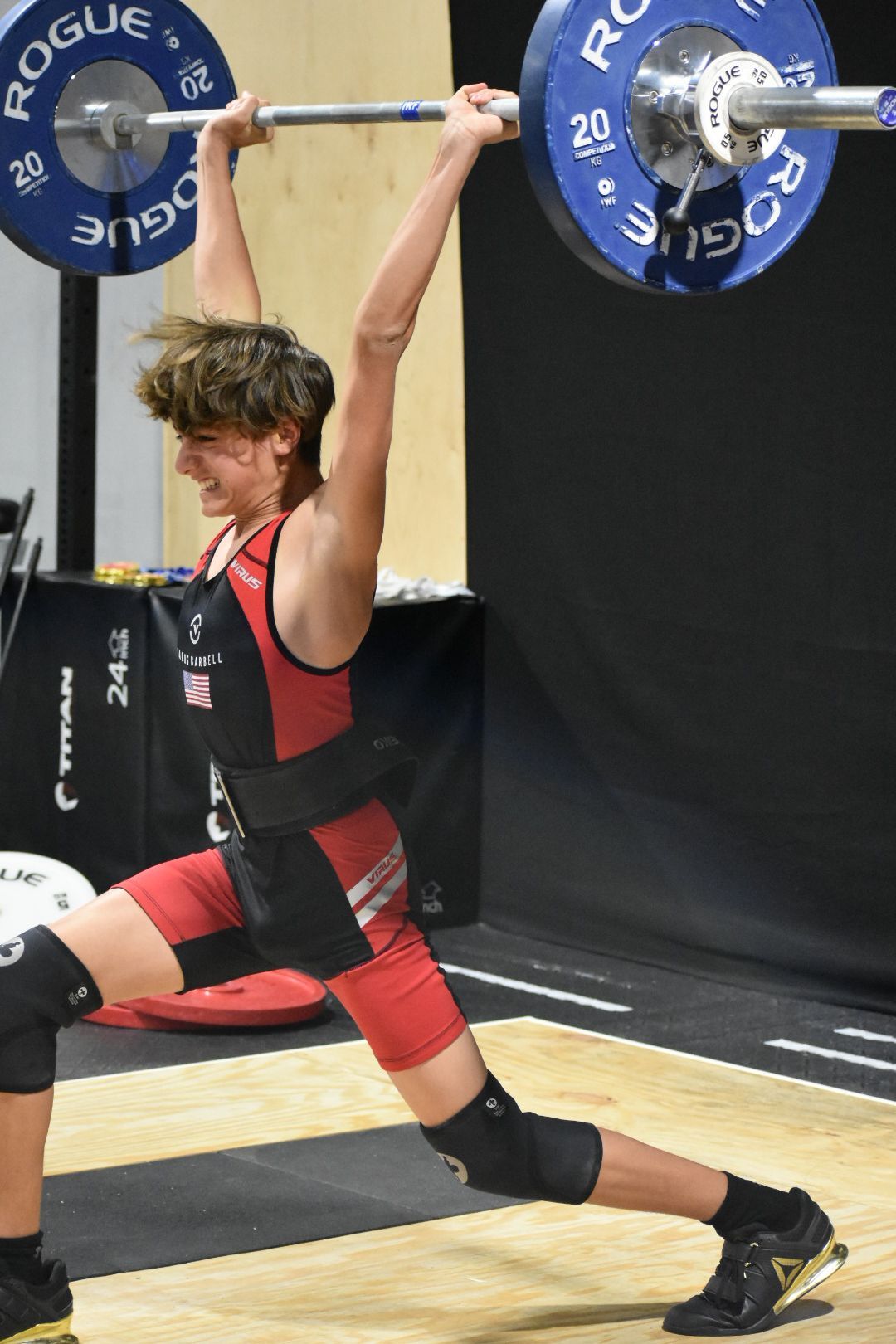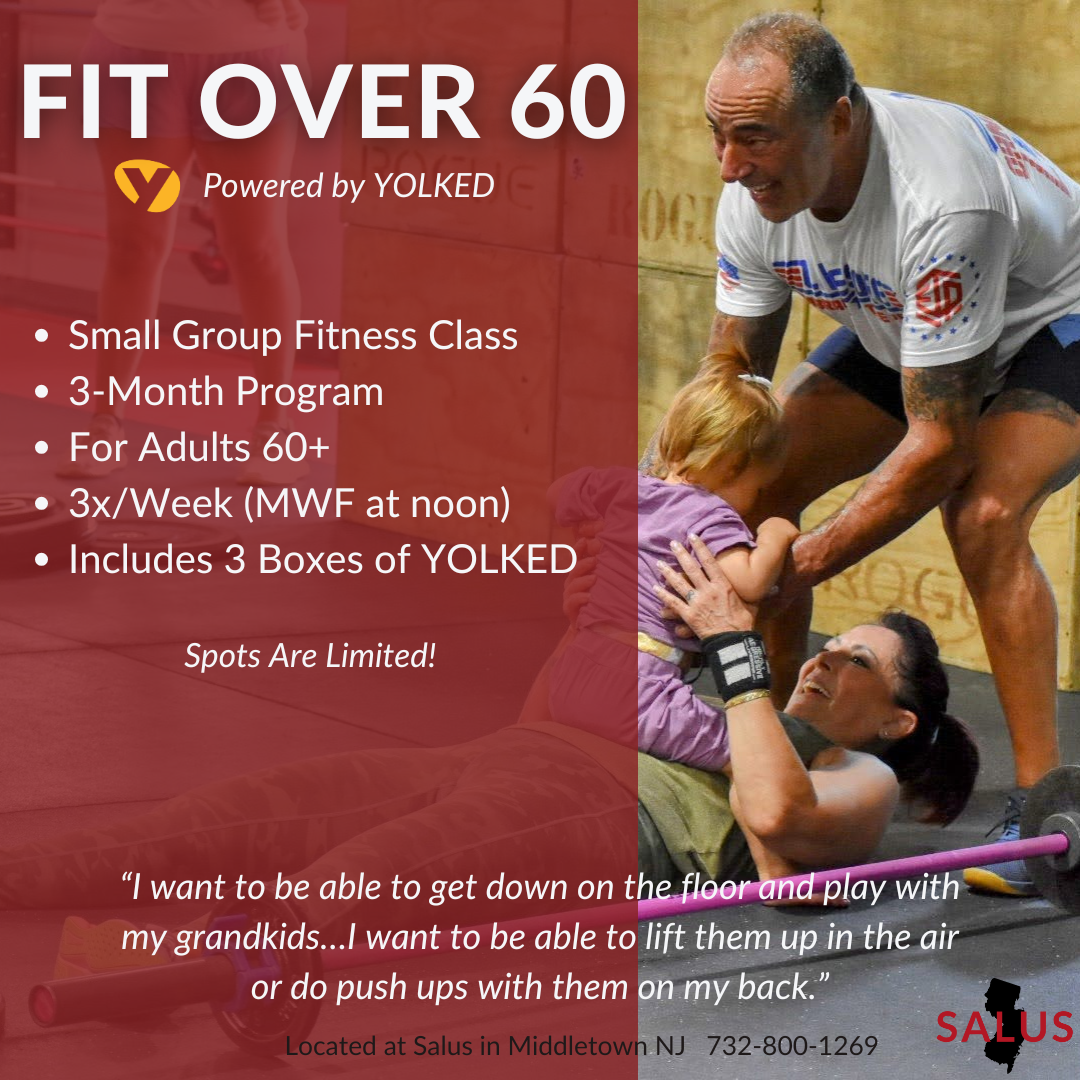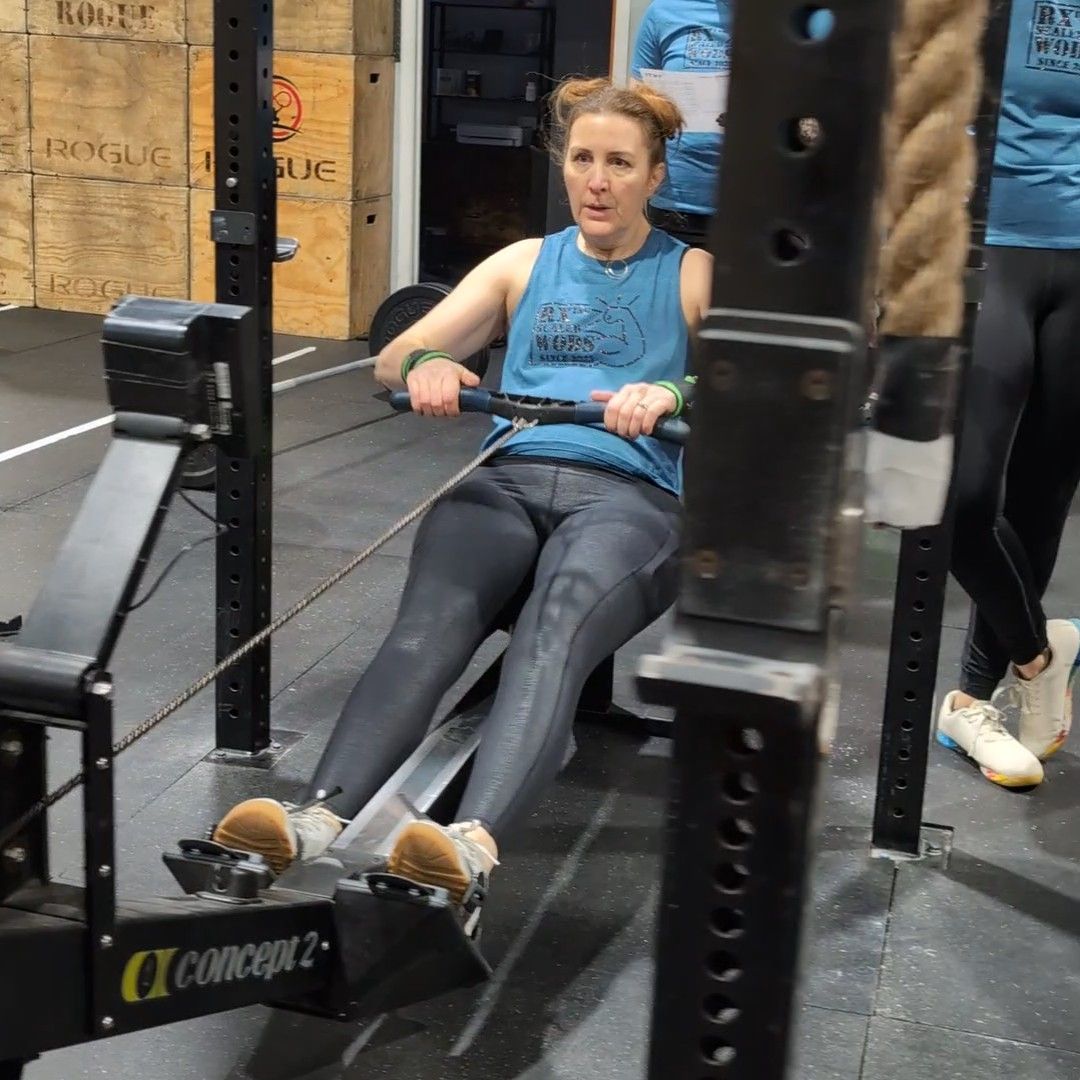Gym Updates & News
MEET THE ATHLETES OF THE MONTH, GET NUTRITION & CROSSFIT TipS, SALUS Updates AND MORE

At CrossFit Salus, we’re proud to have a community filled with athletes who push themselves—and each other—to be better every day. Brandon is one of those athletes. He brings drive, humility, and consistency to every class. Whether he’s battling it out on the whiteboard or dialing in technique during open gym, Brandon leads by example. “Brandon shows up and puts in the work, plain and simple. He’s consistent, competitive, and never backs down from a challenge. We’re often head-to-head in workouts— love the push he brings to the floor!” ~Coach Angela “Oh man, Brandon is such a pleasure to coach and train with. As good of an athlete as he is, he’s always open to cues and corrections to be better. He’s the guy other athletes try to pace with, which makes them better. Not to mention his humbleness—and how cute he and Lori are!” ~Coach Scott “Brandon came in pretty versed with all the advanced moves in CrossFit. But he remains humble and coachable. From giving him a few tips in the snatch to encouraging him to hit those strength goals, Brandon continues to improve, hitting new PRs pretty often.” ~Coach Gino "Brandon is consistently punctual and prepared for each class. His work ethic and effort during each and every WOD is second to none. He sets the bar (for me and many others who check “what did Brandon do in this WOD”). And he sang in an a cappella group in college… If he starts singing in perfect pitch during a WOD, I’d not be surprised. 😂Thanks for representing the best parts of the Salus family Brandon." ~Coach Marc Here’s what Brandon had to say: 1. When and why did you start at Salus? I originally dropped into several gyms in the area once we decided where we would look for a house, including Salus. After having a tough workout where I tried to beat Bill (I did not beat him), yet was loudly cheered on by Scott all the while, I decided Salus was the best out of all the other gyms I tried, and a great place to continue my fitness journey. Turns out we bought a house less than 10 minutes away, so it was a perfect blend of quality and distance! Now I have no excuse. 2. How has your performance changed since you started at Salus? While at the beginning of my Salus time I had residual gymnastic ability, my lifts were just…ok. Over this past year, I have PR’d all my lifts and packed on some muscle. I also finally got the 300lb squat…a PR that I toiled and failed over and over again. I ain’t done yet. Just wait! 3. Are there exercises you can do now that you couldn’t do before? I can finally string chest-to-bar pull-ups together, which in the past have depended upon the alignment of the planets, the direction the wind was blowing, what I ate for lunch that day… 4. How has your body physically changed since you started? I’ve added a bit of muscle, which has helped me stabilize some of these heavier lifts, and feel more comfortable doing really difficult movements like overhead squats. I’ve never felt stronger! But I can be stronger. 5. How has Salus changed you in other ways? It’s motivated me to continue to care about fitness and stay competitive on our gym’s leaderboard. Therefore, I usually eat in service of my performance and have made sure to take care of my body so it’s ready to throw down. I like it so much I even signed up for open gym, which has really helped fill a few of the gaps in my game. I still can’t slide down the rope quickly, though. 6. How do you describe Salus to your friends? I don’t need to describe Salus to friends. They can see the results 😎 7. What keeps you motivated to continue? What's your "why"? I want to beat you in the workout. I also like staying healthy and looking fit! But definitely the race aspect of it is so invigorating. 8. Favorite lift or WOD? I love squat snatches! I’ve got a lot to learn, but they are so fun. 9. What advice would you give to a newbie just joining Salus? I would tell them to make sure their wallet is ready for all the CrossFit gear they are going to want to buy. Grips, shoes, belts, tape, shorts… 10. What is your next goal to accomplish? My life goal is to eventually snatch 185! Next milestone is 175. Brick by brick, baby. 11. If you could design your own WOD, what would it look like? 4 rounds for time: 6 bar muscle-ups 100 double unders 3 squat snatches (135) 50-foot handstand walk After the 4th round, finish with a 50-foot overhead walking lunge to the finish line (2 50lb dumbbells) I like variety! 12. Favorite thing to do for fun? I love going crabbing—I go every year over in the Navesink! Anything on the water is my favorite. 13. Favorite healthy dish...and favorite "splurge" meal? Healthy dish: Chicken Tikka Masala (I hope it’s healthy lol) Splurge: Korean BBQ 😈 14. If you could be an animal what would you be and why? I would be a bird so I could fly! 15. Favorite motivational quote? “There are things you can’t fight: Acts of God…you see a hurricane, you have to get out of the way. But when you’re in a Jaeger, suddenly, you can fight the hurricane. And you can win.” – Pacific Rim, 2013 16. Interesting fact not many people know about you: I did acapella in college, and musical theater in high school! So 0 sports. I also skipped leg day every week before I found CrossFit. I’m payin’ for it now. Congrats, Brandon! We’re proud to have you as part of the CrossFit Salus community in Middletown, NJ—and we can’t wait to see what you’ll crush next. like hitting that 185 snatch. 😉

The CrossFit Games Open is upon us… If you’re new to CrossFit, don’t just tune out and assume that it’s only for the firebreathing CrossFit athletes. We know it might seem intimidating, but that’s why we’re here to support you and help you be the best version of yourself! Here are just a few ...
The post Why You Should Compete in the CrossFit Open appeared first on Salus.

At Salus, we’re all about celebrating the incredible people who make our community so special. This month, we’re excited to shine a spotlight on Joe, our January Athlete of the Month! Joe’s journey at Salus is one of resilience, hard work, and growth. Since recommitting to his fitness journey in June 2024, Joe has made impressive strides in his health and fitness. " I couldn’t be more proud of Joe and his progress. When he arrived at Salus, you could see he was staying in his wheelhouse, choosing to scale workouts so they were at his comfort level. Every so often, I’d show him a new option to increase his workout intensity and while he wasn’t always ready, he remained open minded to at least trying. His diligence has paid off. Lately, I see him trying a heavier weight, a new gymnastics movement, or pushing himself with things like box jumps or running. As a coach, the reward hasn’t been only in seeing improved results from him on the leaderboard. It’s the confidence I see he’s developed. That’s a huge win." ~Coach Erin " Erin pretty much covered it all. Joe is very open to corrections and he’s steadily improving He is the prime example of placing technique 1st, consistency 2nd and then intensity. Joe is also a real nice guy and easy to get along with. " ~Coach Scott " Joe has done CrossFit for a while in the past, then life changed but he has made a great come back. The best part is he focused on discipline, consistency and not comparing him self to the past. As a result he's making progress he's happy with and I'm very proud and happy for him too. " ~Owner/Coach Gino









